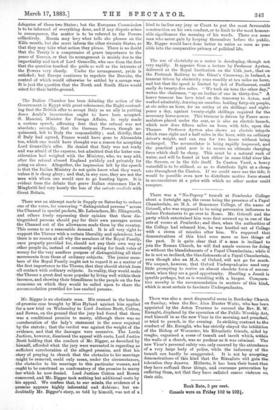Mr. Biggar is an obstinate man. His counsel in the
breach- -of-promise case brought by Miss Hyland against him applied for a new trial on Wednesday to Lord Justices Brett, Cotton, and Bowen, on the ground that the jury had found that there was a conditional promise to marry, although there was no .corroboration of the lady's statement in the sense required by the statute ; that the verdict was against the weight of the -evidence, and that the damages were excessive. The Lords -Justices, however, dismissed the appeal with costs, Lord Justice Brett holding that the conduct of Mr. Biggar, as described by . himself, afforded what the jury were warranted in regarding as sufficient corroboration of the alleged promise, and that his story of praying in church that the obstacles to his marriage might be removed, could only mean, under the circumstances, the obstacles to his marriage to this particular woman, and ought to be construed as confirmatory of the promise to marry her which he now denied. Lord Justices Cotton and Bowen concurred, and Mr. Biggar took nothing but additional costs by his appeaL We confess that, to our minds, the evidence of a promise appears highly inferential and dubious ; but un- doubtedly Mr. Biggar's story, as told by himself, was not of a
kind to incline any jury or Court to put the most favourable construction on his own conduct, or to limit to the most honour- able significance the meaning of his words. There are some men who never gain by keeping themselves before the public. Mr. Biggar would have done better to retire as soon as pos- sible into the comparative privacy of political life.


































 Previous page
Previous page